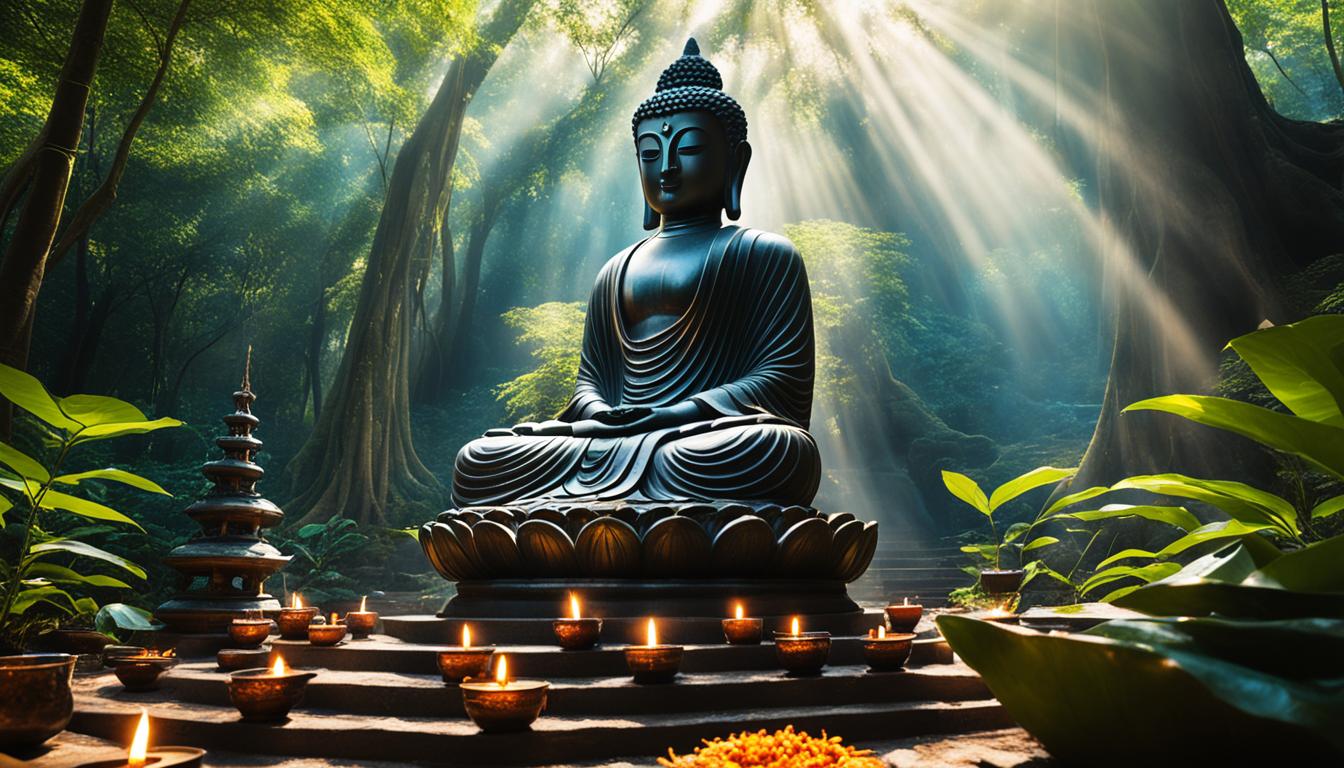Welcome to a journey into the heart of Thai spirituality. Thailand is a country known for its vibrant culture and profound spiritual traditions. The spirituality in Thailand is deeply intertwined with everyday life, influencing the well-being and interactions of its people. The majority of Thais follow Theravada Buddhism, which shapes their beliefs, practices, and sense of purpose.
Thai spirituality incorporates a range of practices, including meditation, traditional beliefs, and rituals that provide individuals with a sense of peace and guidance. The rich heritage of Thai spirituality is evident in its temples, revered monks, and the integration of animistic beliefs.
Join us as we delve into the depths of Thai spirituality, exploring the traditional beliefs, practices, and the cultural significance they hold. Discover the beauty and serenity of Thai temples, experience the transformative power of meditation, and gain a deeper understanding of the spiritual traditions that shape Thai culture.
Key Takeaways:
- Thai spirituality is deeply integrated into everyday life, shaping the well-being and interactions of its people.
- The majority of Thais follow Theravada Buddhism, which influences their beliefs, practices, and sense of purpose.
- Meditation is an essential practice for Thai Buddhists, promoting mindfulness and inner peace.
- Temples, or wats, are significant spiritual centers where Buddhists gather for prayer, meditation, and religious ceremonies.
- Thais incorporate animistic beliefs into their spirituality, seeking protection and blessings from spirits.
Thai Buddhist Teachings and Practices
Thai Buddhism holds a significant place in Thai culture and its influence is evident in the daily lives of its people. As a Thai Buddhist, you strive to attain enlightenment by following the Noble Eightfold Path and engaging in the practice of meditation. Meditation is an integral part of Thai Buddhist teachings and plays a crucial role in cultivating mindfulness, inner peace, and a deeper understanding of reality.
The practice of meditation in Thailand encompasses various techniques, including mindfulness meditation, breath awareness, and loving-kindness meditation. Mindfulness meditation involves focusing your attention on the present moment, observing your thoughts, emotions, and sensations without judgment. This practice helps you develop a heightened sense of awareness and a deeper connection with yourself and your surroundings.
Another technique, breath awareness, emphasizes focusing on the breath as a way to anchor yourself in the present moment. By directing your attention to the sensations of each breath, you attain a state of calm and concentration, bringing stability to the mind and body.
Loving-kindness meditation, also known as Metta meditation, involves directing feelings of love, compassion, and goodwill towards yourself and others. By cultivating these positive emotions, you develop a sense of connectedness and empathy towards all beings, promoting harmony and kindness in your interactions with others.
Thai Buddhist teachings also emphasize the importance of values such as compassion, mindfulness, and respect for elders. These values guide your conduct in society and influence your relationships, fostering a sense of unity and peace.
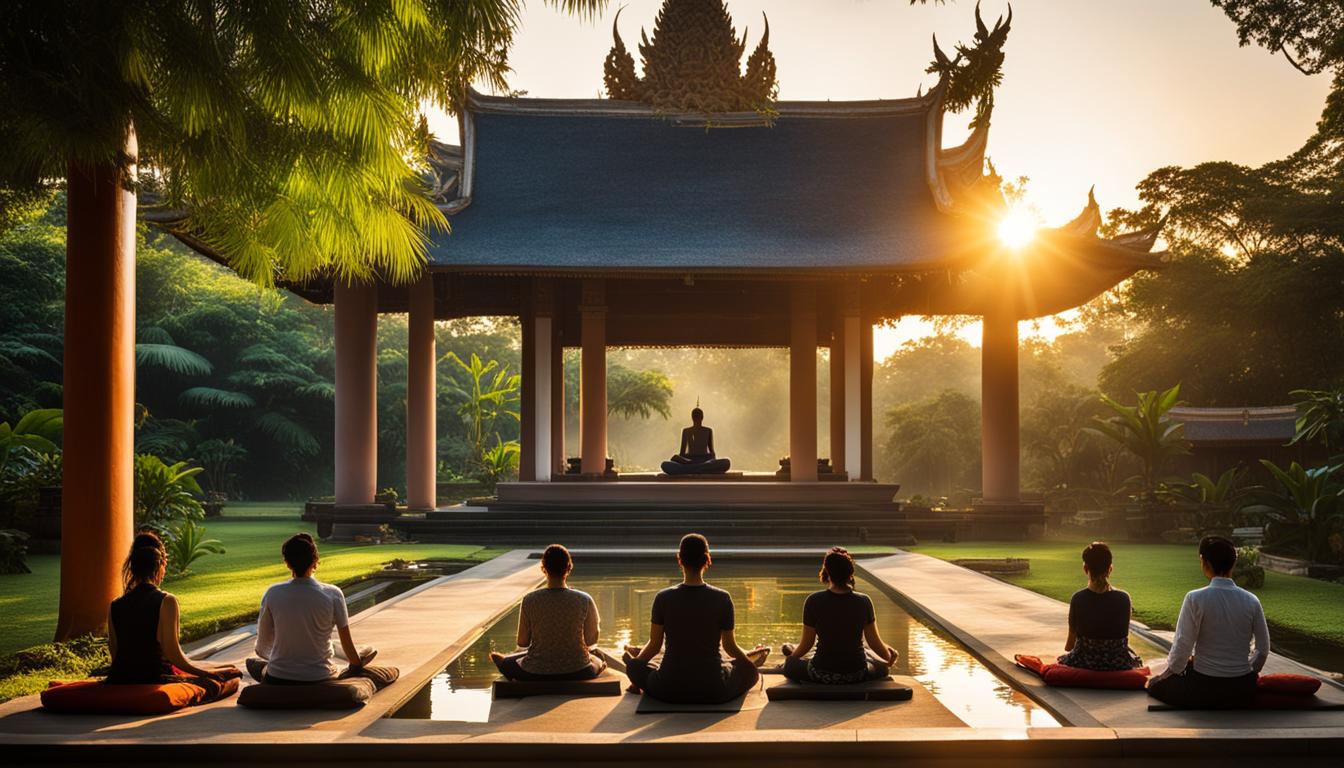
Temples: Spiritual Centers of Thai Culture
Temples, also known as wats, hold a profound significance in Thai culture and spirituality. They serve as spiritual centers where Buddhists come together for prayer, meditation, and religious ceremonies. Beyond their religious functions, these temples also play a vital role as social and community centers, hosting important cultural events.
Some of the most renowned temples in Thailand include Wat Phra Kaew and Wat Arun in Bangkok, as well as Wat Phra That Doi Suthep and Wat Phra Singh in Chiang Mai. These temples offer a serene and tranquil atmosphere that allows visitors to immerse themselves in the rich spiritual traditions of Thailand.
“Visiting a Thai temple is a serene and humbling experience. The moment you step inside, you can feel the sense of peace wash over you. The intricate architectural details, the aroma of incense, and the gentle sound of chanting create a sacred ambiance that touches your soul.”
Exploring Thai temples provides a unique opportunity to observe and respectfully participate in temple rituals. Whether it’s lighting incense, making an offering, or simply sitting in quiet contemplation, these rituals offer a personal connection to Thai spirituality and culture.
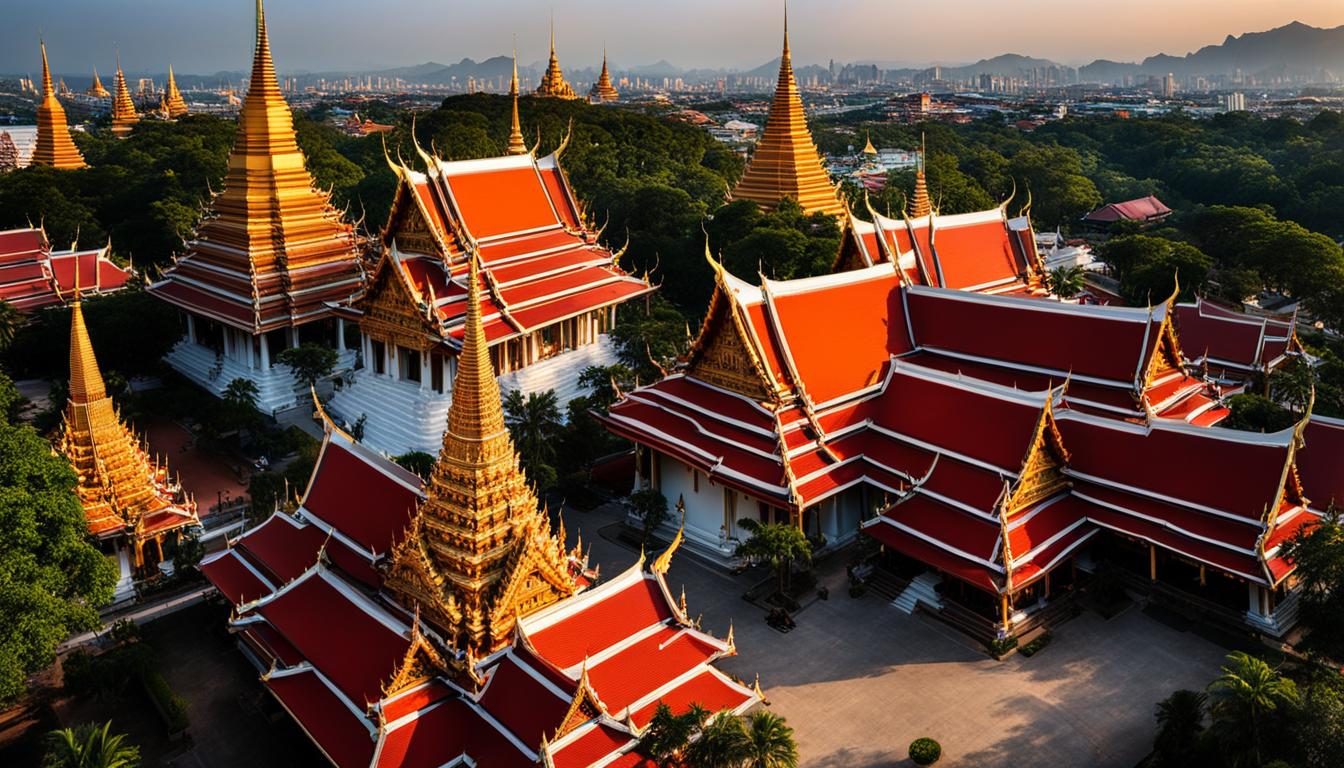
The exquisite beauty of Thai temples, with their gilded roofs, ornate carvings, and vibrant colors, is a sight to behold. Each temple has its own unique charm and significance, making every visit a memorable experience.
The Majesty of Wat Phra Kaew
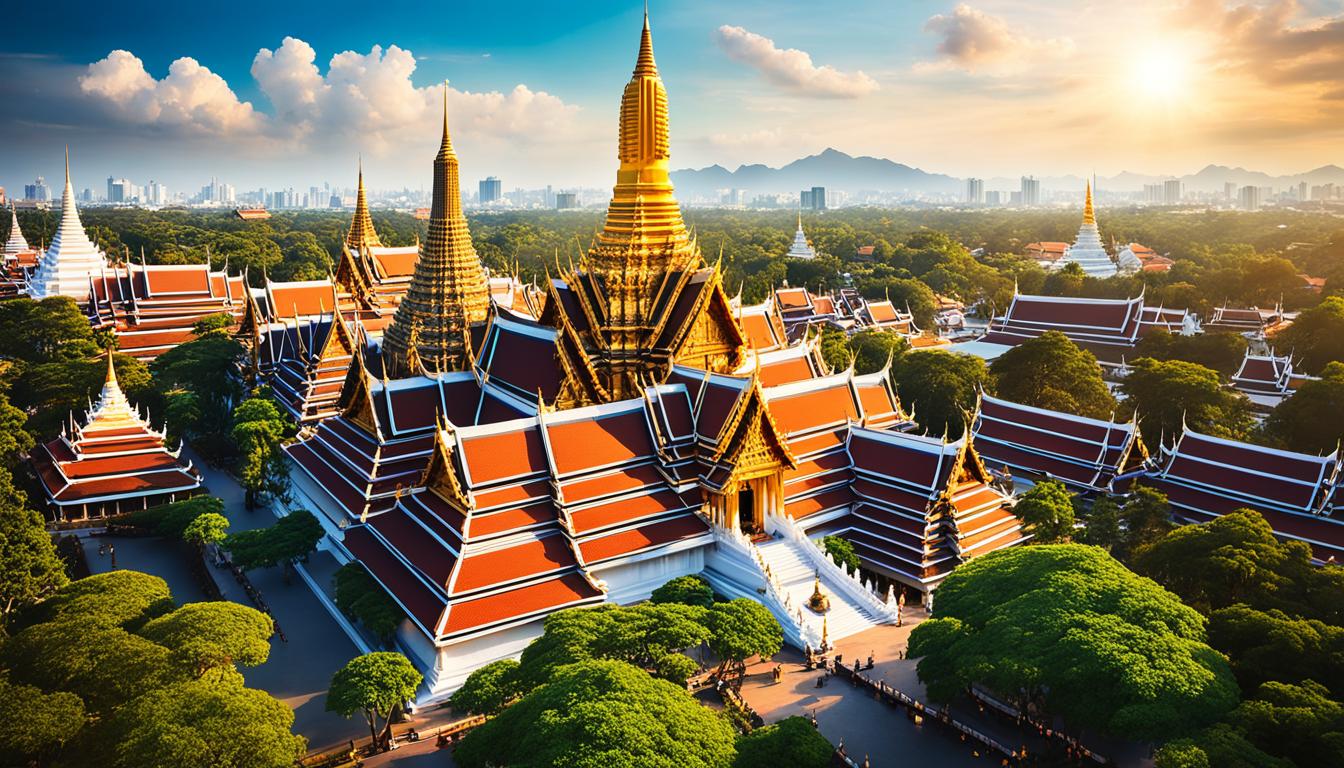
One of the most revered temples in Thailand is Wat Phra Kaew, also known as the Temple of the Emerald Buddha. Located within the grounds of the Grand Palace in Bangkok, Wat Phra Kaew is home to the revered Emerald Buddha statue. This sacred image is considered the palladium of the Kingdom of Thailand, representing both spiritual and political power.
Wat Phra Kaew is a testament to the exquisite craftsmanship of Thai artisans. The temple complex boasts intricate murals, golden structures, and magnificent architecture, making it a must-visit destination for travelers seeking a deeper understanding of Thai spirituality.
Wat Arun: The Temple of Dawn
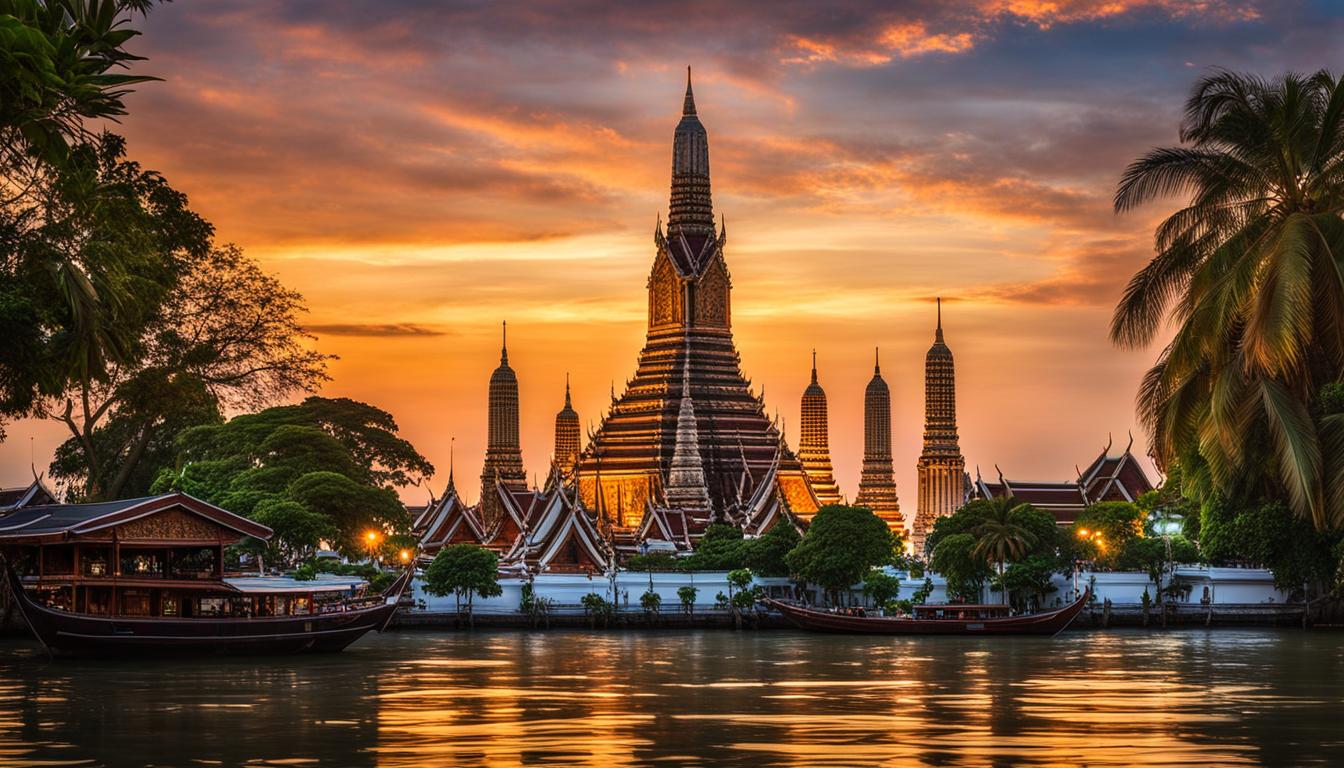
Another iconic temple in Thailand is Wat Arun, also known as the Temple of Dawn. Located on the banks of the Chao Phraya River in Bangkok, Wat Arun is renowned for its stunning spires, known as prangs, which are adorned with intricate porcelain mosaics. Climbing to the top of the central prang offers breathtaking views of the surrounding area, making it a favorite spot for both locals and tourists.
Wat Arun embodies the elegance and grace of Thai architectural design. The temple’s serene setting and spiritual ambiance make it a place of tranquility and contemplation.
Embracing the Sacred at Wat Phra That Doi Suthep
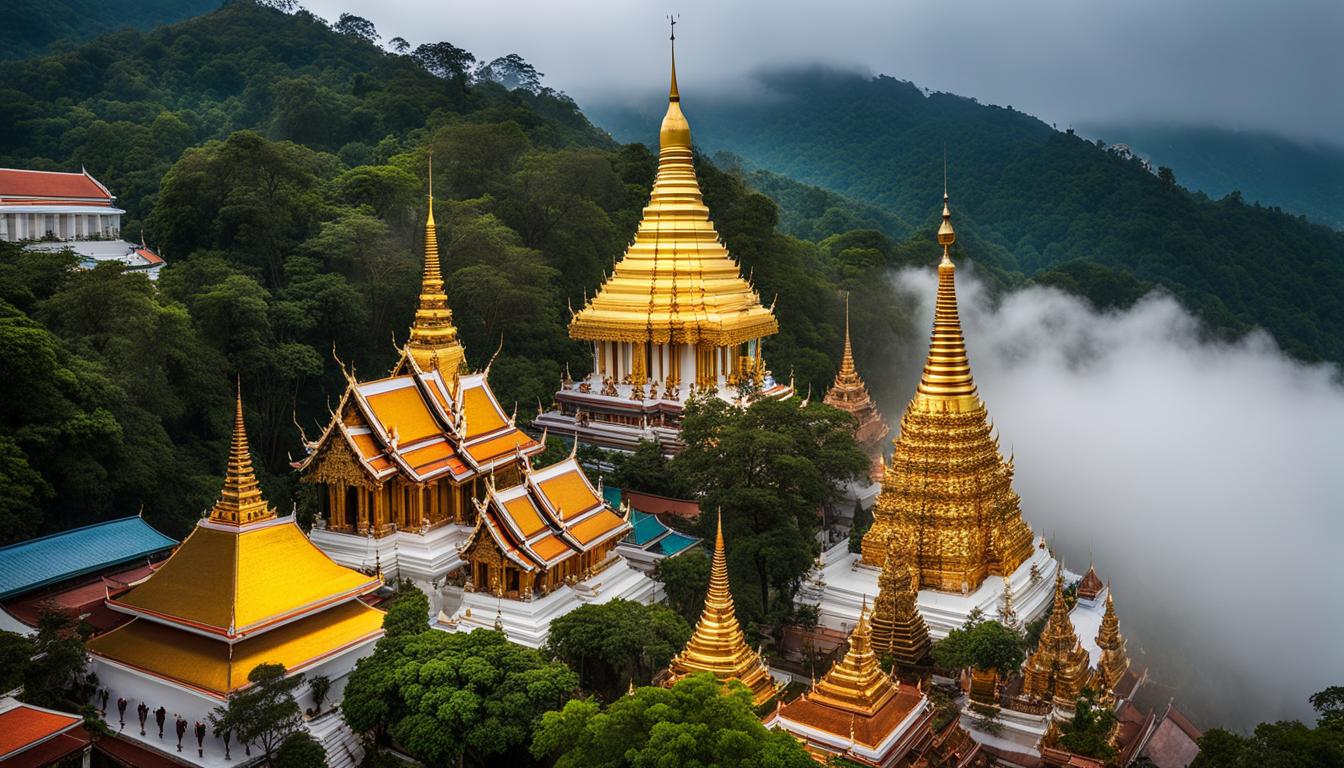
For those seeking spiritual enlightenment, a visit to Wat Phra That Doi Suthep in Chiang Mai is a must. Perched on top of Doi Suthep mountain, this temple offers panoramic views of the city and surrounding countryside, immersing visitors in a tranquil and awe-inspiring atmosphere.
Legend has it that the temple is home to relics of the Buddha, making it one of the most sacred sites in northern Thailand. Climbing the 309 steps to reach the temple is a symbolic journey towards inner peace and enlightenment.
Discovering Wat Phra Singh’s Rich Heritage
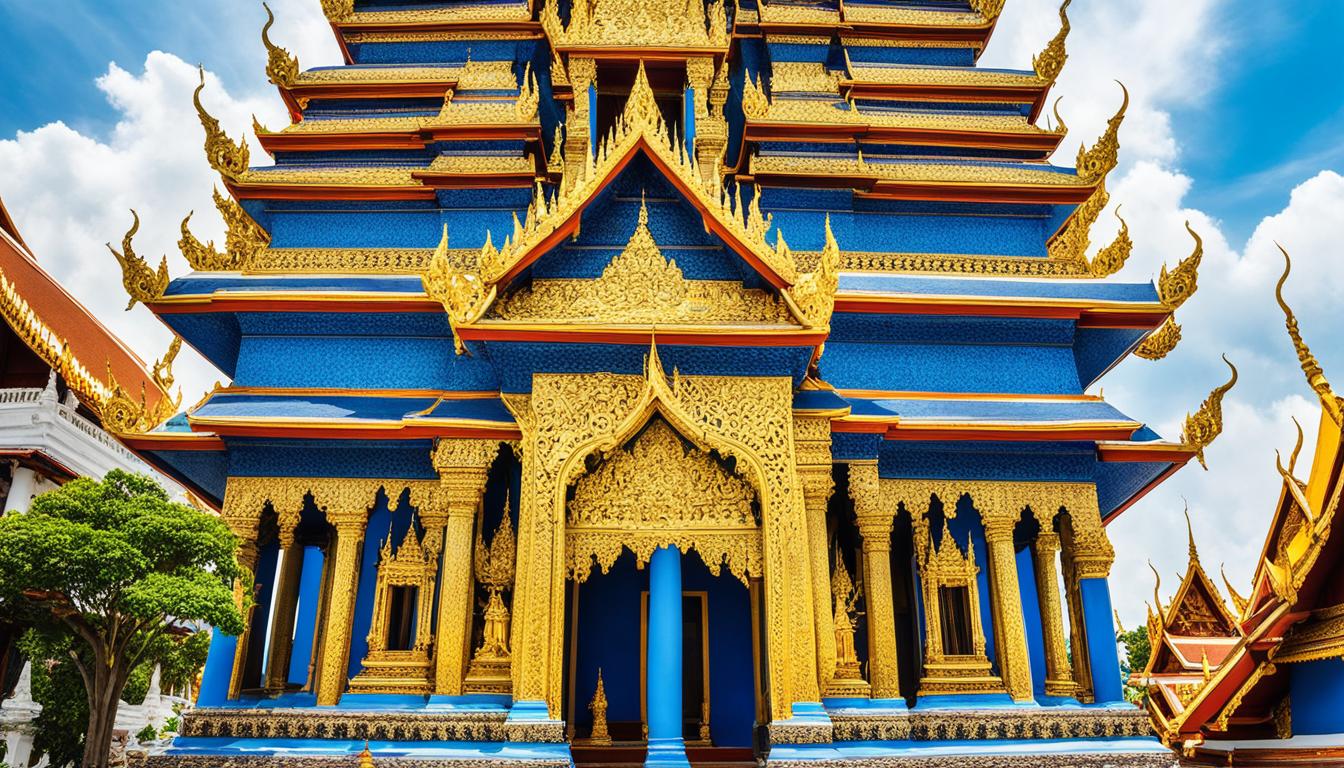
Wat Phra Singh, located in the heart of Chiang Mai, is revered for its historical and religious significance. The temple houses the Phra Singh Buddha, an important Buddha statue that is believed to bring good fortune and blessings to those who pay their respects.
Exploring the temple grounds allows visitors to admire the exquisite Lanna-style architecture and intricate wood carvings that reflect the rich heritage of northern Thailand. Attending a religious ceremony or chanting session at Wat Phra Singh offers a glimpse into the profound spiritual practices of Thai Buddhists.
Temples in Thailand encapsulate the essence of Thai culture, offering a spiritual sanctuary where visitors can witness temple rituals, make offerings, and experience the rich heritage of Thai spirituality.
Incorporating Animistic Beliefs: Spirits and Offerings
In addition to Buddhism, many Thais incorporate animistic beliefs into their spiritual practices. They believe in spirits residing in natural objects like trees, rivers, and mountains. Spirit worship and reverence for local deities, known as “Phi,” are common in rural areas.
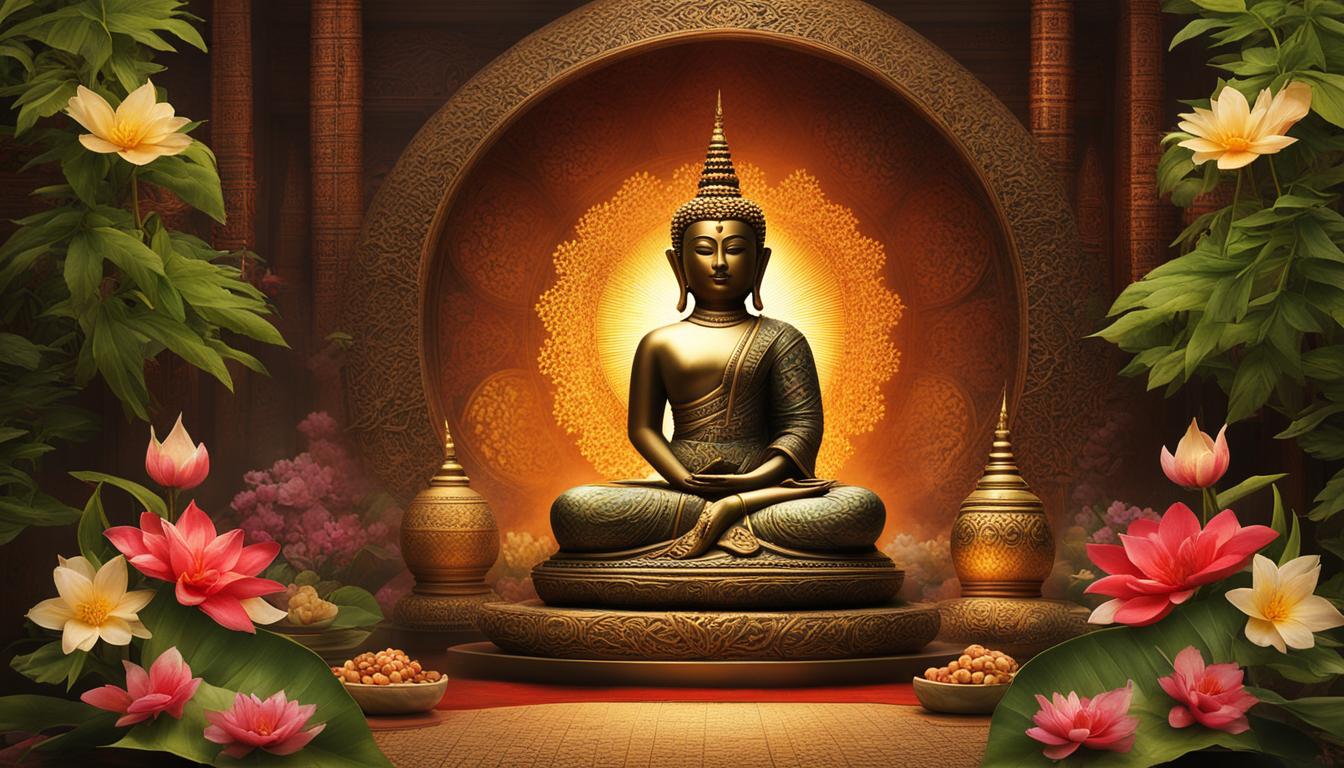
Spirit houses, known as “San Phra Phum,” are visible symbols of the Thai belief in spirits and the interconnectedness between the spiritual and physical realms. Thais offer daily prayers, flowers, incense, and other offerings at these spirit houses to seek protection, blessings, and good fortune. The practice of offering is seen as a way to cultivate generosity and connect with the community.
Cultural Significance of Monks: Giving Alms and Temporary Ordination
Monks hold a revered position in Thai society. Giving alms to monks, also known as “Tak Bat,” is a symbiotic relationship between the monks and Thais. It is a highly revered Buddhist practice in Thailand, cultivating generosity and connecting the community.
This practice involves offering food and other necessities to monks as a virtuous act of merit-making. By offering alms, you not only provide monks with sustenance but also contribute to their spiritual well-being. It is an opportunity to express gratitude, cultivate generosity, and learn from the teachings of the monks. This act of giving is seen as an essential part of practicing Buddhist virtues and developing a compassionate heart.
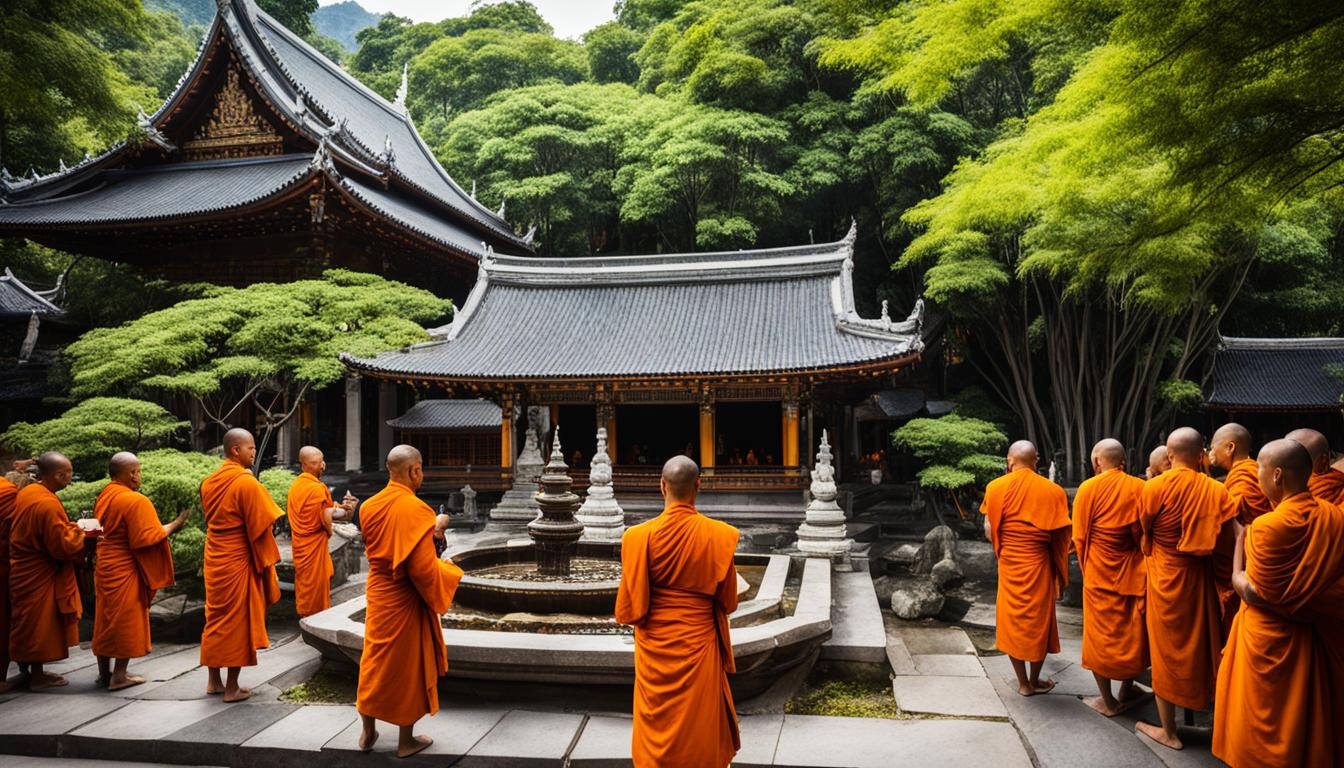
“Tak Bat” can be observed during the morning alms rounds when monks walk barefoot through the streets, carrying their alms bowls. It is a humbling experience to witness this daily ritual and offer your generosity. The act of giving alms not only benefits the monks but also brings blessings and merits to the giver.
Furthermore, temporary ordination is a significant event in a Thai man’s life to gain merit and receive spiritual education. It is a unique aspect of Thai Buddhism that is not practiced in many other Buddhist nations. Temporary ordination allows individuals to immerse themselves in the teachings and rituals of Buddhism, gaining a deeper understanding of Thai spirituality.
During temporary ordination, known as “monkhood,” individuals live in a monastery, following a monastic lifestyle for a specific period, such as a few weeks or months. This experience provides an opportunity to detach from worldly distractions, focus on self-discovery, and cultivate spiritual growth.
“Monkhood in Thailand is not only a personal spiritual journey but also a homage to the monastic tradition that has been passed down for generations,” explains Phra Ajahn Chah, a respected Thai monk. “It allows individuals to deepen their spiritual understanding, develop discipline, and gain insights into the nature of existence.”
Temporary ordination is open to men of any background, and many Thai men choose to participate as a way to accrue merits, fulfill family obligations, or seek guidance on life’s challenges. The experience often brings a sense of accomplishment, inner peace, and a renewed commitment to leading a virtuous life.
Exploring Famous Temples and Festivals
Thailand is home to many famous temples that offer unique insights into Thai spirituality and culture. Among the must-visit temples are Wat Phra Kaew in Bangkok, known as the Temple of the Emerald Buddha, and Wat Arun, also known as the Temple of Dawn.
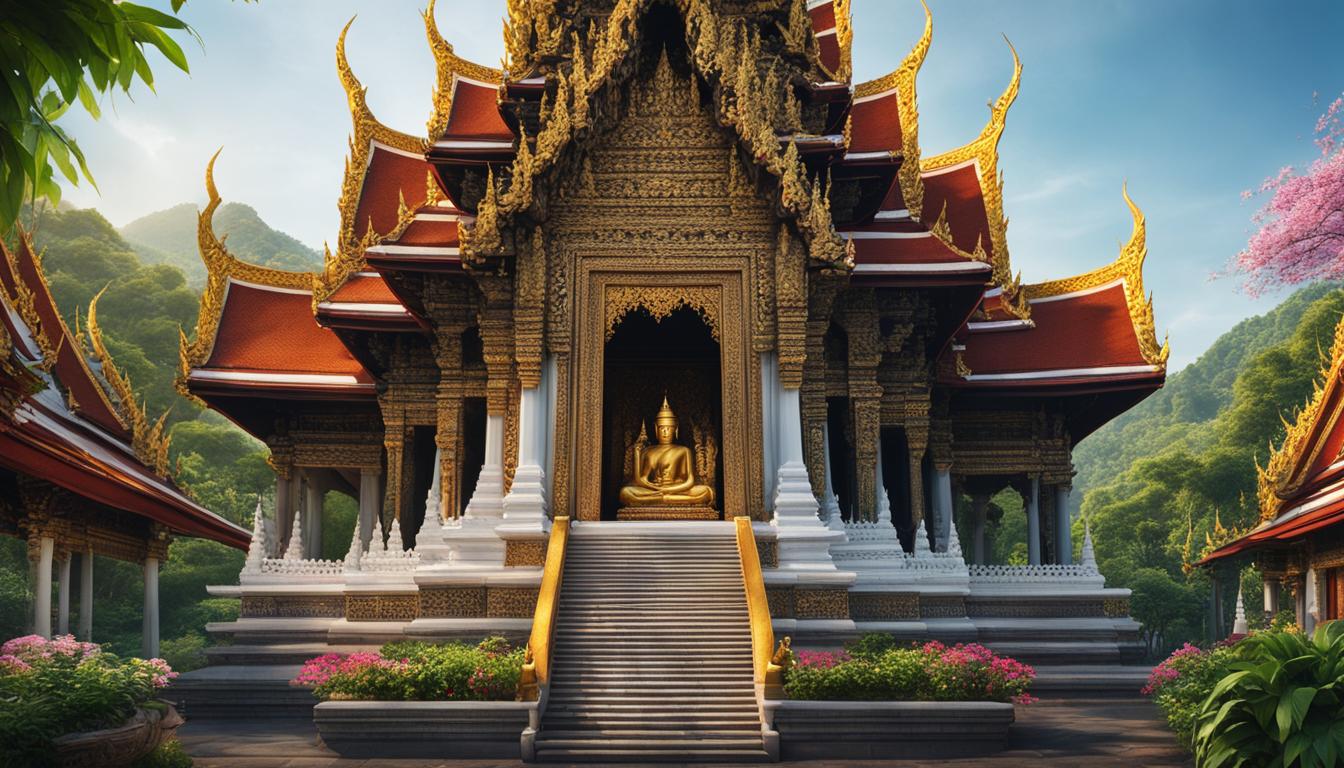
Located in the heart of Bangkok, Wat Phra Kaew is one of the most significant temples in Thailand. It houses the highly revered Emerald Buddha, a symbol of Thai spirituality and a destination of pilgrimage for Buddhists from around the world.
Wat Arun, situated on the bank of the Chao Phraya River, is known for its stunning architecture and intricate details. Its towering spires, adorned with vibrant ceramic tiles and seashells, make it a mesmerizing sight for visitors.
If you find yourself in Chiang Mai, don’t miss the chance to explore Wat Phra That Doi Suthep and Wat Phra Singh. Wat Phra That Doi Suthep, perched on a mountain, offers breathtaking views of the city and houses a sacred relic of the Buddha. Wat Phra Singh, located in the heart of the city, showcases exquisite Lanna architecture and is home to Phra Singh Buddha, the revered Buddha image.
Visiting these temples allows you to observe temple rituals, marvel at their architectural beauty, and gain a deeper understanding of Thai spirituality and culture.
Thai festivals also provide wonderful opportunities to immerse yourself in the cultural and spiritual traditions of the country. One such festival is the Songkran festival, which marks the Thai New Year and is known for its lively water battles and traditional activities. It is an occasion for cleansing and renewal, as Thais splash water on each other and pay respect to their elders.
Another significant festival is Visakha Puja, also known as Vesak. This festival commemorates the birth, enlightenment, and passing away of the Buddha. Buddhists engage in merit-making activities, attend temple ceremonies, and participate in candlelit processions to honor the Buddha’s teachings and life.
The Yee Peng festival is another highlight of Thai culture and spirituality. During this festival, thousands of lanterns are released into the night sky, creating a mesmerizing spectacle. The floating lanterns symbolize the release of worries and a hope for a brighter future.
Exploring these famous temples and participating in Thai festivals provides a profound experience of Thai spirituality, offering you the chance to witness the rich cultural heritage and find a deeper connection with the traditions that have shaped Thailand for centuries.
Conclusion
Exploring Thai spirituality offers a profound insight into the rich traditions, beliefs, and practices that shape the soul of Thailand. Thai culture is deeply intertwined with spirituality, and Buddhism plays a central role in the lives of Thais.
Temples serve as spiritual centers where Buddhist rituals and ceremonies take place, allowing individuals to connect with their inner selves and find solace. The presence of monks, who are highly respected figures in Thai society, adds to the spiritual ambiance of these temples. Giving alms to monks is not only a significant act of generosity but also a way to deepen one’s spiritual connection and cultivate virtues such as compassion and mindfulness.
In addition to Buddhism, Thai spirituality incorporates animistic beliefs and reverence for local deities. This adds a unique dimension to Thai culture and reflects the interconnectedness between the physical and spiritual realms. Immersing yourself in Thai culture and spirituality provides a valuable opportunity to gain a deeper understanding of the Thai way of life, find inner peace, and connect with the traditions that have shaped Thailand for centuries.
FAQ
What is Thai spirituality?
Thai spirituality refers to the personal and cultural beliefs and practices that are deeply rooted in Thai culture. It is heavily influenced by Theravada Buddhism, which promotes mindfulness, meditation, and the pursuit of inner peace.
How does Buddhism influence Thai culture and spirituality?
Buddhism is the predominant religion in Thailand, and its teachings heavily influence Thai culture and spirituality. Thais strive to achieve enlightenment through meditation and following the Noble Eightfold Path. Buddhist values such as compassion, mindfulness, and respect for elders greatly impact their daily lives.
What role do temples play in Thai spirituality?
Temples, or wats, are significant spiritual centers where Buddhists gather for prayer, meditation, and religious ceremonies. They also serve as social and community centers, hosting important cultural events. Temples offer a serene atmosphere and the opportunity to observe and respectfully participate in temple rituals.
What are some popular Thai meditation practices?
Thai Buddhists practice various meditation techniques, including mindfulness meditation, breath awareness, and loving-kindness meditation. These practices cultivate mindfulness, inner peace, and insights into the nature of reality.
What are animistic beliefs, and how do they relate to Thai spirituality?
Animistic beliefs in Thailand involve the belief in spirits residing in natural objects such as trees, rivers, and mountains. Thais seek protection and blessings from these spirits through offerings and rituals. Spirit houses, known as “San Phra Phum,” are visible symbols of these beliefs.
What is the cultural significance of monks in Thai society?
Monks hold a revered position in Thai society. Seeking advice from monks and giving alms to them, also known as “Tak Bat,” are common practices. Monks also play a significant role in important life events and ceremonies, and temporary ordination allows individuals to gain spiritual education.
Which are some famous temples and festivals in Thailand?
Thailand is home to many famous temples, including Wat Phra Kaew and Wat Arun in Bangkok and Wat Phra That Doi Suthep and Wat Phra Singh in Chiang Mai. These temples offer unique insights into Thai spirituality. Thai festivals like Songkran, Visakha Puja, and Yee Peng also offer opportunities to explore Thai culture and spirituality.
How does exploring Thai spirituality contribute to a deeper understanding of Thai culture?
By immersing yourself in Thai spirituality and culture, you can gain a deeper understanding of the Thai way of life, find inner peace, and connect with the traditions that have shaped Thailand for centuries. Thai spirituality provides individuals with a sense of purpose, guidance, and inner peace.
Source Links
- https://elevatedestinations.com/2023/09/01/thailand-demystifying-spiritual-explorations-asia/
- https://press.fourseasons.com/goldentriangle/trending-now/exploring-thai-culture-and-spirituality/
- https://thailandguidebook.org/interests/culture-religion/

